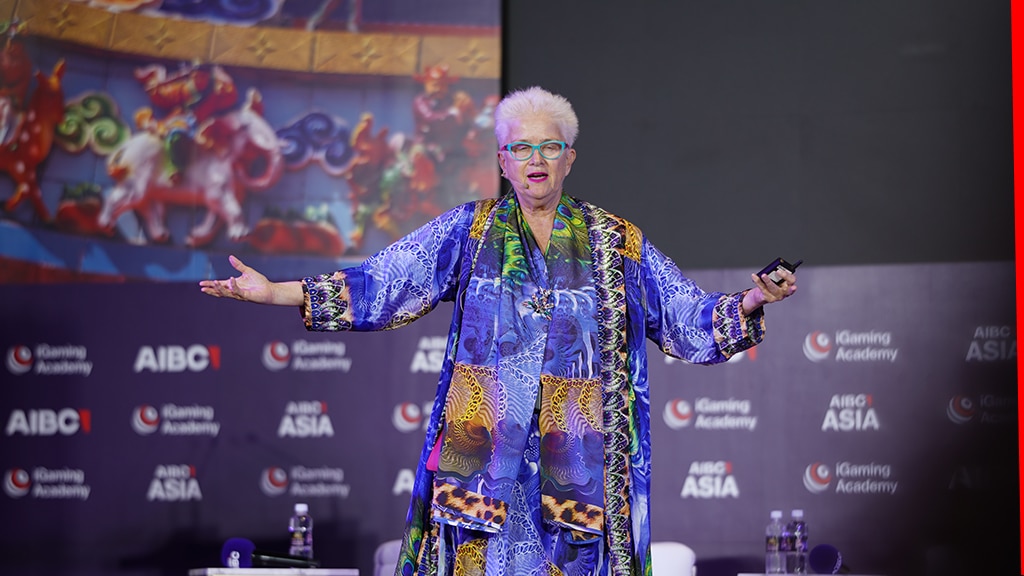- Roadshow to Rome
- Awards
- Exhibitors
- Speakers
- Media Partners
- News

In a compelling keynote address delivered on the AIBC stage as part of the SiGMA Asia conference and expo taking place in Manila this week, Dr. Jane Thomason, a global thought leader in blockchain and emerging technologies, painted a bold and vivid picture of the future where gaming, blockchain, and digital economies intersect to reshape societies.
It all began, as she recalled, in 2016. “My son came to me and asked, ‘Mom, did you get any of that Bitcoin when I told you?’” she shared. Back then, Bitcoin had surged to around $2,000 – far above its $0.06 price tag in 2010. A thousand-dollar investment would’ve made her a billionaire. But her son wasn’t just talking crypto. “Bitcoin is built on blockchain,” he told her, “and you need to learn about that.”
That conversation sparked a journey that would take Dr. Thomason deep into the world of blockchain, gaming, and digital transformation. Her son, a gamer, also opened her eyes to gaming – not just as entertainment, but as a cultural and economic force poised to redefine our future.
Dr. Thomason emphasised the convergence of technologies: blockchain, AI, VR, spatial computing, and digital assets – all of which are already embedded in the gaming ecosystem. These tools aren’t just shaping virtual experiences; they’re sculpting the way we work, learn, socialize, and even fall in love.
In the digital age, children growing up on platforms like Roblox are building data-driven resumes without ever drafting a CV. These platforms record their problem-solving skills, leadership qualities, and collaboration styles – offering a new kind of credential that employers may one day value more than traditional degrees.
“Asia is indisputably the world’s biggest gaming market with nearly 3.5 billion players – from the top 100 gaming companies in the world, 62 are from Asia. We are in the epicenter of the future of gaming. <“
The gaming market in the region is valued at close to $400 billion, with mobile gaming now accounting for 50% of all activity. Innovation hubs across Southeast Asia are cultivating talent, developing eSports ecosystems, and exporting Asian gaming narratives to the world. “The issue of connectivity in emerging markets is key.
The growth of gaming is going to come from emerging markets and it’s going to be mobile growth.” 79% of people under 22 are playing mobile games. “Console games are for the rich – mobile games are for everyone.”
“Asia is building the future of gaming with esports”, she goes on to say. Indeed, the population of esports players is expected to grow to 600 million.
eSports, she noted, is no longer a niche. “Streaming is the new stadium,” she declared. With 2.5 billion hours of gaming content watched and 15 million daily views globally, gaming is now the biggest form of entertainment and leisure in the world.
Dr. Thomason also highlighted the rapid emergence of the Middle East as a key player. Saudi Arabia, for instance, has grown into the 19th largest gaming market globally, with gamer revenues averaging $270 per person – far exceeding China’s $32. In 2024, the country hosted the world’s largest eSports prize pool and aims to become a global gaming hub.
With nearly 400 million Arabic speakers and a 95% smartphone penetration rate, the Middle East has nearly as many gamers as Europe – and a young, tech-savvy population ready to fuel its ascent.
The most transformative impact of gaming, according to Dr. Thomason, lies in its ability to shape new economic models. Web3, NFTs, digital currencies, and AI are coalescing into a framework where users own, govern, and profit from their participation. “Digital property rights,” she said, “will unlock innovation and wealth creation in an open metaverse.”
And yes, she’s still using the term metaverse. Despite Meta’s public missteps, the concept of immersive, persistent digital environments enhanced by AR, VR, and spatial computing is very much alive. From virtual fashion to digital dating, entire economies are emerging in these spaces.
She described a future where people don’t just work from home – they work in games. Where digital avatars represent our persistent identity across platforms. Where education, healthcare, and even aging are gamified. “AI and blockchain,” she noted, “are the yin and yang of the digital future.”
For countries like the Philippines and others in the Global South, the opportunity is immense – but so is the responsibility. “We have to train our young people in VR, 3D printing, and AI,” she warned. “Universities move too slowly. The world won’t wait.”
And with Gen Z and Gen Alpha growing up with mobile phones as extensions of their identity, the integration of physical and digital life is only accelerating. “They socialize through games. They live online. This is their world.”
Dr. Thomason’s message was clear: gaming is not just play – it is the foundation of the next economy. From Asia to the Middle East, from blockchain to AI, from avatars to virtual property, a new society is emerging.
“If you want to understand the future,” she concluded, “you have to understand the gamers.”